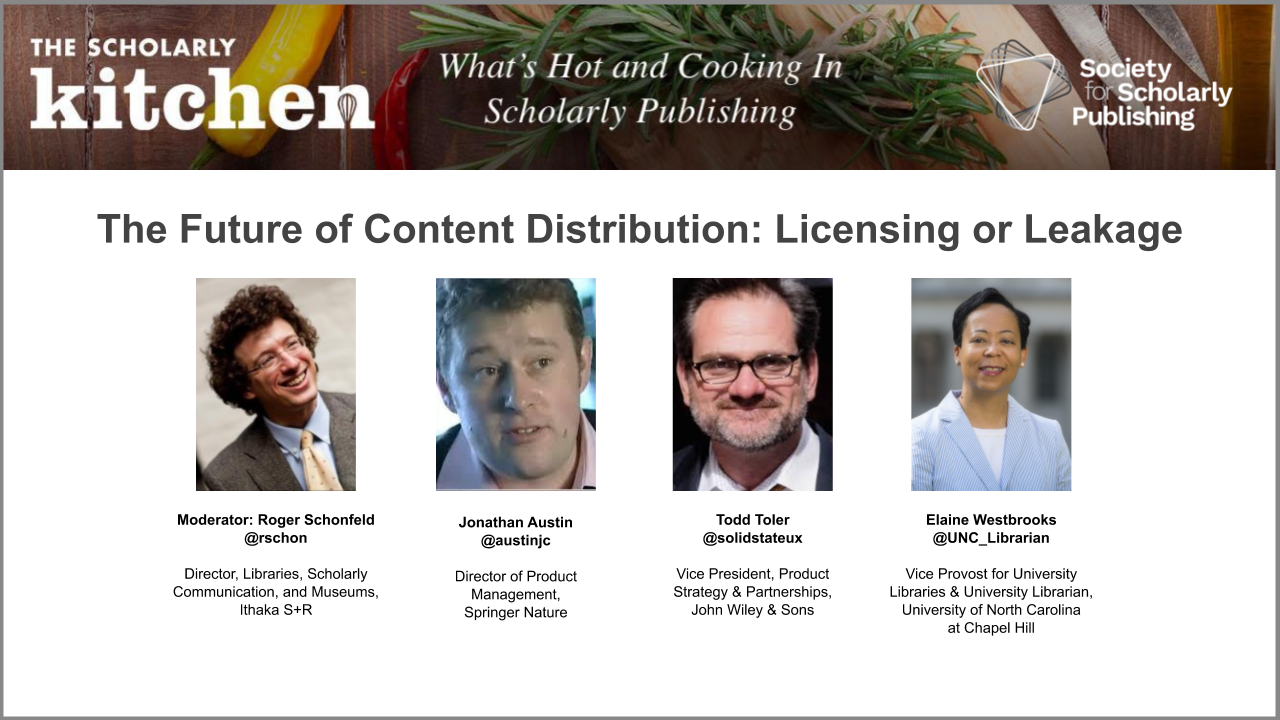
Journal articles are leaking from publisher platforms — to government and institutional repositories, scholarly collaboration networks like ResearchGate and Academia.edu, and pirate sites, namely Sci-Hub. As a result, a declining share of usage is taking place on the publisher sites. More importantly, a declining share is attributable to the library sales channel, putting into question the value of Big Deal bundles.
Introduced by moderator and Chef blogger Roger Schonfeld (Director, Libraries, Scholarly Communication, and Museums, Ithaka S+R), this Scholarly Kitchen webinar examined how publishers and librarians are thinking about issues of licensed vs. leaked content, and steps they are taking to transform business models for the future.
First off, Elaine Westbrooks (Vice Provost for University Libraries & University Librarian, University of North Carolina at Chapel Hill) discussed how being in in a leadership position, she is fortunate to be able to rethink partnerships with publishers. With precedents established by the University of California system and European colleagues to revisit licensing, she feels that it is evolving from a transactional relationship to a discussion of value. For example, UNC has a pilot partnership with Sage—that while not quite a “transformative agreement” to Gold Open Access, it represents a “transitional agreement” thanks to more faculty engagement with negotiations.
Speaking of relationships with UNC faculty, she noted that while technology enables access to content beyond the library, going outside proper channels points to issues with convenience, which is a top priority for researchers. The library is not seen as a go-to place, but we need to find ways to give faculty the content they need and demonstrate this value proposition. Walking away from big deals is complicated, and we need to understand this behavior better, she claimed.
Todd Toler (Vice President, Product Strategy & Partnerships, Wiley) addressed the issue of library discovery systems as a convenience factor for users and how there has not been a lot of change with these platforms. Journals have been online since 1995, yet we are still not fully accommodating changes in behaviors like remote and mobile access, so we need to define subscriber value if ResearchGate is instead becoming the de facto channel for discovering content.
Jonathan Austin (Director of Product Management, Springer Nature) agreed that adding value to the user experience is vital. Springer’s platform does a good job of finding the right audience, amplifying the value of content, making it more useful to the reader, and connecting it back to the author/institution. Still, these can be done in other ways.
For instance, to get better visibility and find the right audience, Springer launched a pilot partnership in 2018 with ResearchGate. This required acknowledging shared values of serving researchers and being a catalyst for change, though with different ways to approach the same problem. Springer trialed making 30,000 full-text journal articles available on ResearchGate and, after working through some authentication and access issues, is finding that authors and readers loved the experience.
The conversation then shifted to distribution, access, and discovery in an OA environment. Todd mentioned that this is complicated by a combination of Gold vs. Green OA, with 65% of Wiley content being freely available online somewhere legally already. Is the ‘version of record’ necessarily the best version for the user?
Jonathan added that the move to OA doesn’t solve all researcher problems, make papers easy to understand or make content more useful. How do you ensure provenance of an article with corrected or retracted versions being presented as the version of record? Proliferation of science causes a lot of noise, and the publisher provides the signal—that is, the guarantee, he emphasized.
Elaine pointed out that OA is but one outlet and doesn’t yet change the library strategy. Subscribed content will still be with us for the medium term and we’re not changing fast enough to leverage the technologies we have. The citizens of NC should have access to research at UNC but they still don’t. She posited, “How dare we as a public institution lock knowledge behind paywalls?”
The Q&A continued, covering issues of innovating with third parties (one size doesn’t fit all and we are better together, claimed Jonathan); the continued lure of the journal brand to publisher sites vs. agnostic platforms (publishers add context but users do not want to log onto publisher sites to comment on articles, noted Todd); and the value of usage metrics (Elaine asserted that cost per download is not an equitable comparison across disciplines and is a killer for a lot of fields, say linguistics compared to pharmacy).
The webinar closed with an audience question about data loss from partnering with collaboration networks and what analytics are collectible from platforms like ResearchGate, both for the publisher and the library. Todd noted that, privacy issues aside, ResearchGate does capture audience data from voluntary researcher profiles, but that this transformational social network potential could cause further disintermediation with an audience for publishers. Jonathan added that Springer Nature learned from its pilot program that respecting privacy is the most important thing. Elaine suggested meanwhile that academic societies are in a good position to collect valuable data about their users, but that they don’t always know how to use it to add value, and that finding a way to use this data for good without sacrificing privacy is one way forward.
- “The Future of Content Distribution: Licensing or Leakage?” will be available in the SSP library in mid-January.
News contribution by SSP member, Michael Groth. Mike is the Director of Marketing at Cenveo Publisher Services.


Join the Conversation
You must be logged in to post a comment.